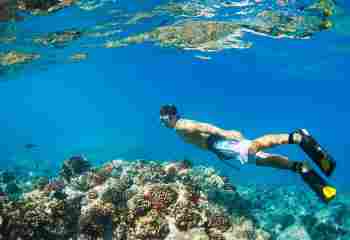More About Rehabs with Surf Therapy
Surf therapy incorporates nature therapy (the ocean) and exercise (balance, swimming). It’s used in addiction treatment to promote self-efficacy, provide a new coping tool, and a way to manage stress. Surf therapy can also connect you to other like-minded people in recovery as you tackle waves and challenges together.
What Happens in Surf Therapy?
Your surf therapy session may look different depending on your groups’ skill level. If you’re a beginner, you’ll likely spend a few sessions learning the basics, like how to stand on your board. Your surf instructor will help you stay grounded and mindful during the experience. They may point out your lack of control over the ocean and how you have to adapt and change to stay afloat. . You may notice right away how that applies to recovery, and life in general.
Once you get more experience, or if you start with some experience, you’ll begin catching waves. You may go one at a time or with your whole group.
Many ages can safely enjoy surf therapy. As long as you can swim in potentially choppy/deep waters, your body should be up for the challenge.
Benefits of Surf Therapy for Addiction
Surf therapy can boost your self-confidence as you master a new skill, adapt to the unpredictable ocean, and strengthen your bonds with others. Surfing also serves as a metaphor for balance in recovery. Just as you learn balance on the waves, so you can balance and stay atop life’s challenges.
Surf therapy also pushes you physically. You may end up tired, frustrated, and wanting to call it quits. But then, you get a good wave, regain your balance, and your discipline pays off. Those same negative feelings can arise during recovery. After surf therapy, though, you’ll have more experience coming out on the other side and dealing with your emotions as they come.
Surf therapy offers joy and adrenaline, something those in recovery may struggle to find without substances. The physical excursion can also help with sleep, manage boredom, and provide a pleasurable rush of endorphins.
Benefits of Surf Therapy for Mental Health
Surf therapy was found to lessen symptoms of depression, anxiety, post-traumatic stress disorder, and overall mental health. Surfing can improve mental health in children, teens, and older adults. The benefits come from physical excursion, self-efficacy, an ongoing sense of accomplishment, and connecting with nature and peers.
Risks of Surf Therapy
Surf instructors and program volunteers make every effort to ensure your safety. But, since you’re out in the ocean, you risk running into aquatic animals like jellyfish, sharks, and prickly crustaceans. Some areas of the ocean floor may also have sharp rocks or coral. In some cases, you could also come in contact with harmful algae, toxins, and bacteria.
Ocean currents can also pose a risk. Your surf instructor will know where to surf and not surf to avoid dangerous currents, like rip currents. Not knowing how to swim, exhaustion, or getting caught in a wave could cause drowning.
If you have any physical limitations or concerns, be sure to let your surf instructor know before getting in the water.




































